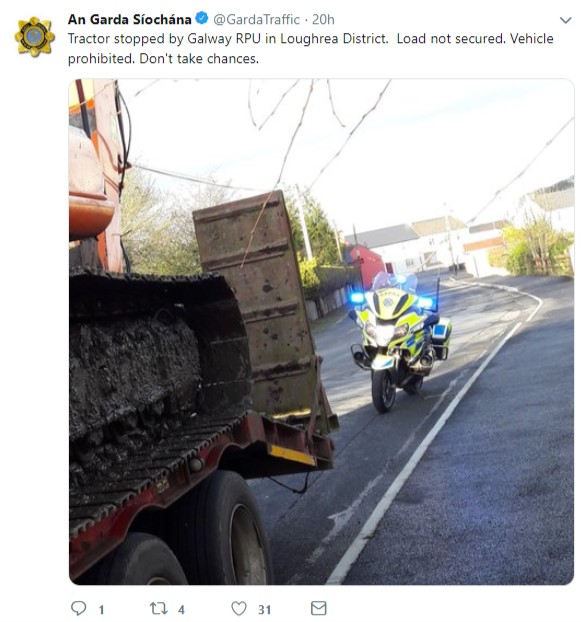A tractor was stopped by Gardai in the west of the country recently for improper restraint.
Taking place in Loughrea, Co. Galway, members of the Galway Road Policing Unit (RPU) stopped the driver, who was drawing an excavator in a low-loader, for not securing the load.
In a tweet posted on social media yesterday, the An Garda Siochana Twitter account noted: “Tractor stopped by Galway RPU in Loughrea District. Load not secured. Vehicle prohibited. Don’t take chances.”
Tractor stopped by Galway RPU in Loughrea District. Load not secured. Vehicle prohibited. Don’t take chances. pic.twitter.com/1xmKnMmRYH
— An Garda Síochána (@GardaTraffic) March 10, 2019
[yes-app]
[/yes-app]
Travelling with an unsecured load poses a number of risks for both the driver of the vehicle and other road users, the Road Safety Authority (RSA) has said.
The RSA insists that all loads must be secured even if the vehicle is only travelling a short distance or at low speeds.
- Loss of control of vehicle;
- Objects to fall on or hit people;
- Road obstruction or collision where a driver is required to swerve to avoid fallen items;
- Failure to secure loads properly may also result in financial losses due to damaged goods and vehicles, lost working time, clean up costs and legal costs.
The RSA has said that a load shall not be carried on a vehicle on a public road in such a manner that part of the load is liable to fall on the road.
A load must not drag on the surface of the road, so as to cause damage to the road or to be liable to cause danger, it also advises.
Operators or drivers should employ a load restraint method suitable to the load being carried, according to the RSA.
Load security is not just the sole responsibility of the vehicle driver. Employers, vehicle owners, drivers and loading and unloading staff all have a role to play in ensuring loads are secure, the RSA said.

